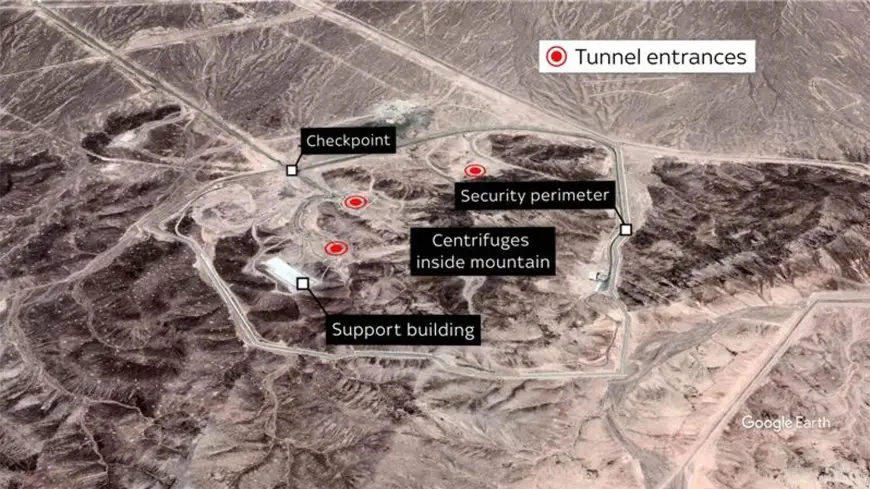Shockwaves in the Gulf: U.S. Bombs Iranian Nuclear Sites – Full Breakdown of Targets, Casualties, and Tehran’s Reaction
The U.S. launched strikes on Iran’s nuclear facilities, targeting Fordow, Natanz, and Isfahan. Here’s what was hit, how many were killed, and how Iran has responded.

In a major escalation, the United States launched a targeted airstrike campaign on Iranian nuclear infrastructure, aiming to dismantle Tehran’s uranium enrichment capacity. As the dust settles, the world watches anxiously amid fears of regional instability.
What Happened: Timeline of the Strikes
Late on the night of June 21, the U.S. military, in coordination with Israeli intelligence, launched precision airstrikes on three critical nuclear sites in Iran:
-
Fordow Fuel Enrichment Plant – Located deep within a mountain near Qom, this highly fortified facility was struck using GBU-57 Massive Ordnance Penetrators, designed to destroy underground bunkers.
-
Natanz Enrichment Complex – The heart of Iran’s nuclear operations, home to thousands of centrifuges.
-
Isfahan Nuclear Technology Center – A key research facility focused on nuclear materials and advanced centrifuge testing.
Military Sources Say “Mission Accomplished”
U.S. officials described the strikes as a “surgical success,” with one Pentagon spokesperson confirming:
“The three targets were chosen for their strategic significance. All were hit with extreme precision, minimizing collateral damage while maximizing operational impact.”
The operation involved B-2 stealth bombers and submarine-launched Tomahawk missiles. According to initial reports, the entire campaign lasted under 90 minutes.
Casualties: Conflicting Reports Emerge
The Iranian Health Ministry has confirmed at least 224 deaths, including nuclear staff, Revolutionary Guard soldiers, and civilian security personnel. However, opposition groups and independent observers suggest the toll could be closer to 400, especially in Natanz and Fordow where some personnel were working overnight.
No U.S. casualties have been reported.
Among those believed killed are two senior engineers with Iran’s Atomic Energy Organization and several IRGC commanders stationed at Isfahan.
Iran’s Reaction: “An Act of War”
Within hours of the attacks, Iran's Foreign Ministry condemned the strikes as a “flagrant violation of international law.” Government spokesman Nasser Kanaani delivered a televised statement, saying:
“The Islamic Republic of Iran holds the United States fully responsible for this unprovoked aggression. We retain the right to respond—at a time and place of our choosing.”
He added that Iran would be lodging formal complaints with the United Nations and was “coordinating with regional allies” for a response.
Iran also claimed that its early-warning systems had detected the incoming threats, allowing partial evacuation of the targeted facilities. This may have prevented an even higher death toll.
Global Reactions
Russia and China have both condemned the U.S. strikes. A spokesperson for the Russian Foreign Ministry described the attack as “dangerous adventurism,” warning it would “inflame an already volatile region.” China urged “maximum restraint.”
European Union leaders expressed deep concern, calling for an emergency session of the UN Security Council. French President Emmanuel Macron stated:
“While Iran’s nuclear ambitions are worrisome, this path of unilateral military action risks opening the gates to a broader war.”
Israel, meanwhile, praised the strikes. Prime Minister Benjamin Netanyahu said, “The world is safer today than it was yesterday. Iran's nuclear program will no longer threaten our existence.”
Is This the Beginning of a Larger Conflict?
Analysts believe this may only be the beginning. Iran’s vast proxy network—including Hezbollah in Lebanon, Houthi rebels in Yemen, and various Shia militias in Iraq—could be activated in the coming days. U.S. military bases in the Gulf, Iraq, and Syria have already raised their threat levels to “critical.”
In a late-night briefing, a senior U.S. defense official said:
“This was not an act of war, but an act of deterrence. We hope Iran understands the message. However, we are fully prepared for any retaliation.”
What's Next?
The International Atomic Energy Agency (IAEA) is expected to issue a formal statement. The Biden administration may also face legal and political scrutiny for bypassing Congressional approval under the War Powers Act.
Back in Iran, massive crowds gathered in Tehran for funerals and protests, chanting slogans against both the U.S. and Israel. Internet speeds in the country have been throttled, fueling speculation about cyberattacks or internal suppression of dissent.
The coming days will be critical.














